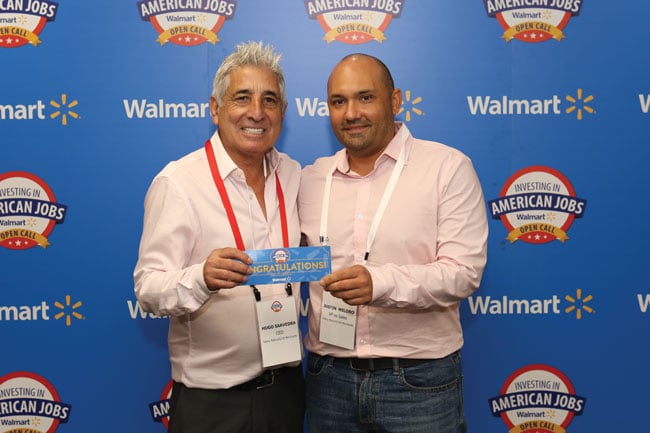At least five Los Angeles County-based businesses are gearing up to make their debut in Walmart Inc. stores after being selected at the retail giant’s annual Open Call, a demonstration day where it seeks out American-made products.
Walmart is a game changer, with more than $500 billion in annual sales. Approximately 90 percent of the U.S. population lives within 10 miles of a Walmart store, according to a recent retail report by Moss Adams, a Seattle, Wash.-based investment firm.
“Your brand is instantly known and becomes a household name once inside Walmart,” said Frank Kaufman, a retail analysts at Moss Adams.
A total of 57 California companies were invited to Walmart’s headquarters in Bentonville, Ark., and given 30 minutes each to pitch their products.
The five Los Angeles companies knew by the end of the day that Walmart was interested in their products. Several of them will see their products hit the chain’s shelves as early as fall.
The companies are Culver City-based D’Vash Organics, makers of date fruit syrup; Luxe West Inc., which is also based in Culver City and makes picture frames; Hawthorne-based MagnetPal, makers of magnet-based products; Vernon-based apparel company L.A. Brands; and Chatsworth-based Saavy Naturals Inc., makers of personal care products.
Luxe West cofounder Jim Ressler had been looking to expand his production capabilities, and entrée with Walmart led him to sign a 20,000-square-foot lease on a production facility in Gardena, he said.
“Besides validation, it opens up the world to us,” he said of the Walmart contract. “It’s the biggest retailer in the world, we want to create more jobs locally, and this is one way to do it. We couldn’t have done it without their support.”
Moss Adams’ Kaufman nevertheless advises caution.
“It’s a double-edged sword,” he said. “They (Walmart) have a whole lot of expectations that smaller companies may find challenging to fulfill. It’s great if you’re on the list but a lot of products are coming off the shelves to make room for new ones. Remember that.”
Preparations
David Czinn, co-founder of D’Vash, will see his date syrup in 250 Walmart stores as early as December 2018. The size of the order and other contract details are currently being worked out. His contract manufacturing operations in Anaheim are expected to spike, and he’s putting premium on effective communications to ensure the company handles the higher demand, he said.
Similar planning is being outlined by Craig McManis, founder of MagnetPal, who said he’s been given an initial order from Walmart but declined to provide order details.
“I’ll have some sort of forecast so that’ll help,” he said. “I’ll need to plan inventory well in advance and make significant investments like hiring and deploying additional shifts.”
A total of 500 companies from throughout the U.S. were invited to pitch meetings with Walmart buyers, the company said. Not everyone walked away with an order but there might be other opportunities, said Kinna Thomas, a senior buying manager at Walmart.
“Companies get on our radar with Open Call,” she said. “If for some reason a product isn’t what we want but the company has something we want, whether it’s location, the company’s supply chain, etc., we do ask if they could consider being a private label manufacturer for Walmart.”
Private label manufacturing is typically done on a contract basis for retailers who put their own brand on the product.
“For us, the biggest question is, ‘Is your company ready to meet the demand?’” she said. “We hope to hear yes. And we immediately identify gaps if you aren’t ready but if I’m interested in what you have to offer, I’m ready to walk you through what that process is to get to that point.”
Domestic focus
Earning shelf space or a private-label deal with Walmart is a first step – and customers’ response to a product will determine if it stays in the retailer’s lineup, said Thomas.
In 2013, Walmart pledged to purchase $250 billion worth of American-made goods over the next 10 years. But within two years the company had to do away with the “Made in USA” on more than 100 products that did not meet Federal Trade Commission standards for the American-made label.
All components of a product must be made and assembled in the United States to have a “Made in the USA” label, according to the FTC.
“We only want companies that source, manufacture and assemble in the USA,” Thomas said.
Walmart’s push into building its domestic supply chain could put it ahead of the game amid the Trump administration’s tumultuous approach on global trade, Moss Adam’s Kaufman said.
“With all the new developments about trade tariffs recently, this could work out very well for Walmart. But companies will have to find a way to develop their products at Walmart prices.”
Most of the retailer’s products comes from off shore for a reason, they compete for price, he said. “If an item is very labor intensive, it will be hard.”

